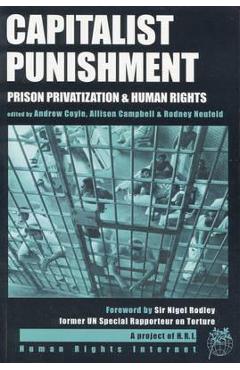- Informatii telefonice:(+40) 748 400 200
Capitalist Punishment: Prison Privatization and Human Rights - Rodney Neufeld, Andrew Coyle, Allison Campbell
Cod intern: xsales_11503530Vizualizari: 32 / Achizitii: 25
Pret: 85.45 RON
Acest produs este publicat in categoria Librarie la data de 10-10-2023: 10:10 si vandut de Libris. Vanzatorul isi asuma corectitudinea datelor publicate. ( alege finantarea potrivita )
-
Produs cu garantie
-
Livrare direct din stocul fizic al Libris
-
Retur gratuit minim 14 zile de la data achizitiei
Capitalist Punishment : Prison Privatization and Human Rights Edited by Rodney Neufeld, Andrew Coyle and Allison Campbell Prison privatization is rapidly increasing in many Western countries. But how is the public well-being served when prisons are run for maximum profit? Bringing together an accomplished group of writers and activists, Capitalist Punishment discusses prison privatization within its historical and ideological context, and in relation to international standard minimum rules developed by the United Nations. Capitalist Punishment examines the adverse effects of private prisons on inmates related to physical and sexual abuse, health care, education, training, and rehabilitation. It describes the impact on prison staff, from whose salaries corporate profits are wrung, and of cost cutting in the design of facilities and allocation of personnel. Special attention is paid to the effect on vulnerable groups such as women, children, and disproportionately incarcerated minority and indigenous communities. Revealing important links between neo-liberal policies locally and their global effects, Capitalist Punishment offers a disturbing glimpse into the transnational spread of privatized incarceration, as developing nations bound by IMF restrictions are forced into the hands of transnational corporations.











Scrie parerea ta
Capitalist Punishment: Prison Privatization and Human Rights - Rodney Neufeld, Andrew Coyle, Allison Campbell
Ai cumparat produsul Capitalist Punishment: Prison Privatization and Human Rights - Rodney Neufeld, Andrew Coyle, Allison Campbell ?
Lasa o nota si parerea ta completand formularul alaturat.
Capitalist Punishment : Prison Privatization and Human Rights Edited by Rodney Neufeld, Andrew Coyle and Allison Campbell Prison privatization is rapidly increasing in many Western countries. But how is the public well-being served when prisons are run for maximum profit? Bringing together an accomplished group of writers and activists, Capitalist Punishment discusses prison privatization within its historical and ideological context, and in relation to international standard minimum rules developed by the United Nations. Capitalist Punishment examines the adverse effects of private prisons on inmates related to physical and sexual abuse, health care, education, training, and rehabilitation. It describes the impact on prison staff, from whose salaries corporate profits are wrung, and of cost cutting in the design of facilities and allocation of personnel. Special attention is paid to the effect on vulnerable groups such as women, children, and disproportionately incarcerated minority and indigenous communities. Revealing important links between neo-liberal policies locally and their global effects, Capitalist Punishment offers a disturbing glimpse into the transnational spread of privatized incarceration, as developing nations bound by IMF restrictions are forced into the hands of transnational corporations.
Acorda un calificativ